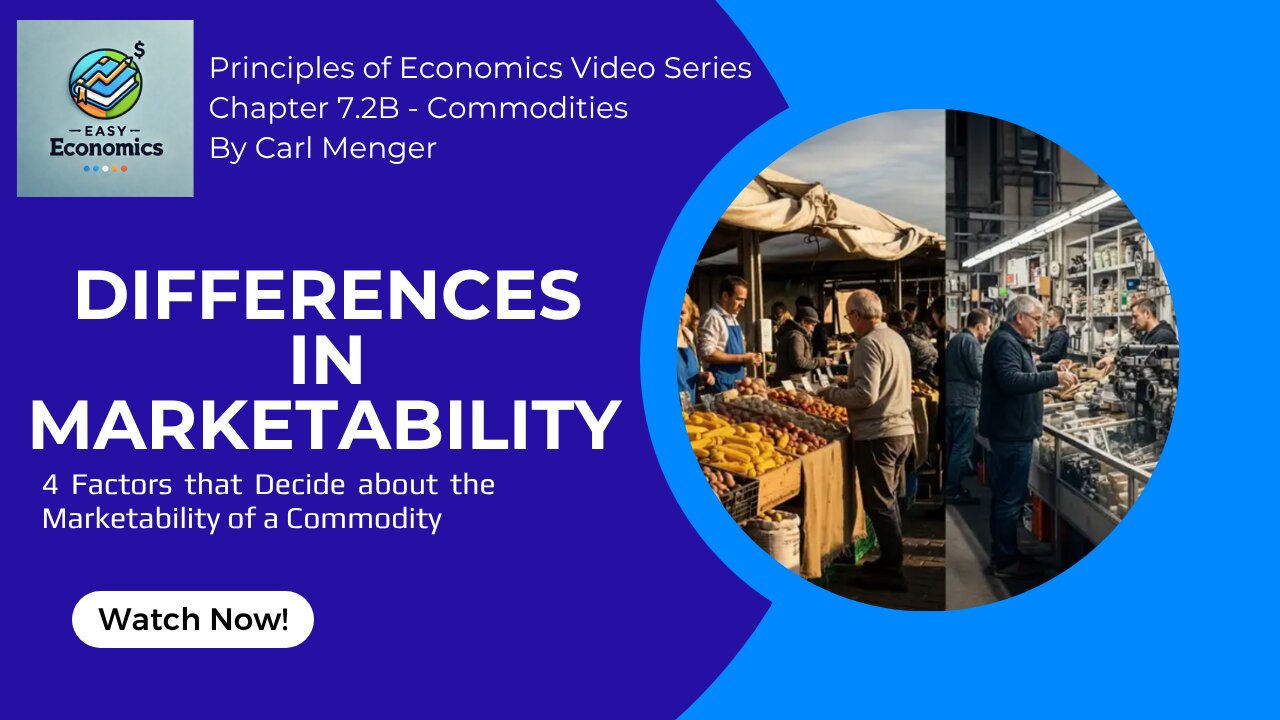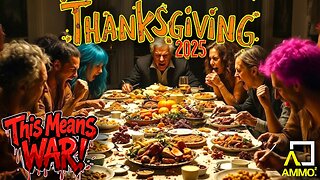Premium Only Content

Principles of Economics by Carl Menger Chapter 7.2B - Differences in Marketability of Commodities
You want to read the book? Get it here: 👉
https://amzn.to/4exiAKW
Watch the next video in this series: https://rumble.com/v6vipxb-principles-of-economics-by-carl-menger-chapter-7.2c-circulability-of-commod.html
Watch the video series from the start: https://rumble.com/playlists/I48mBTB4w2c
Watch our video about Carl Menger: https://rumble.com/v61z0l2-carl-menger-the-father-of-austrian-economics-and-subjective-value.html
Why are some goods easy to sell and others a struggle to move? In this video, we explore Carl Menger’s Principles of Economics, Section 7.2B: On the Different Degrees of Marketability of Commodities.
Marketability isn’t just about whether a good can be sold—it’s about how easily and reliably it can be sold at a fair price. Menger shows us that even within legal and physical trade limits, commodities differ greatly in their degrees of marketability.
Key factors include:
1️⃣ Number of buyers – Goods like grain and metals have broad appeal, while rare instruments or niche books have few interested customers.
2️⃣ Location of markets – Some goods are tradable anywhere; others are tied to a few specific cities or regions.
3️⃣ Speculation – Highly marketable goods are often traded in anticipation of resale, like gold or wheat.
4️⃣ Timing – The more frequently a good can be sold (daily vs. annually), the more liquid and marketable it becomes.
Goods with strong, organized markets—like grain, wool, or securities—are easier to sell because they’re backed by trading institutions, regular price listings, and active buyer networks. Less marketable goods, like decorative items or technical equipment, face unpredictable prices, limited buyers, and longer sales delays.
Understanding these degrees of marketability is key to grasping why some goods function almost like money—and why others require time, effort, and luck to convert into value.
❓ Questions This Video Answers:
-What is meant by "degree of marketability"?
-Why do some goods sell faster and easier than others?
-How do organized markets increase a good’s marketability?
-What role does speculation play in trade?
-How do time and location affect sales opportunities?
-Why are niche products harder to sell?
-What makes grain or gold "as good as cash"?
-How do market reports and exchanges support trade?
-What are examples of highly vs. poorly marketable goods?
-How can sellers reduce the risk of unsold inventory?
00:00 - Introduction to Different Degrees of Marketability
00:11 - Internal and External Limits to Marketability
00:36 - Defining Commodities and Fair Pricing
01:29 - Organized Markets and Trading Centers
02:25 - Four Key Factors Affecting Marketability
03:38 - Practical Examples and Comparisons
04:51 - Outro
#MarketabilityExplained #CommodityLiquidity #CarlMenger
-
 1:52:38
1:52:38
Man in America
8 hours agoCommunists VS Zionists & the Collapse of the American Empire w/ Michael Yon
46.6K12 -
 LIVE
LIVE
Akademiks
3 hours agoSheck Wes exposes Fake Industry. Future Not supportin his mans? D4VD had help w disposing his ex?
1,493 watching -
 6:43:43
6:43:43
SpartakusLIVE
7 hours agoTeam BUNGULATORS || From HUGE WZ DUBS to TOXIC ARC BETRAYALS
97.6K2 -
 LIVE
LIVE
BlackDiamondGunsandGear
3 hours agoAre You that guy? / Carrying a Pocket Pistol /After Hours Armory
548 watching -
 LIVE
LIVE
Camhigby
3 hours agoLIVE - Riot Watch Portland, DC, NC
217 watching -
 2:54:58
2:54:58
CAMELOT331
5 hours agoYouTube Just Told Me I OWE THOUSANDS $ TO THEM... update
20.2K4 -
 2:00:53
2:00:53
Tundra Tactical
13 hours ago $0.89 earned🛑LIVE AT 9PM CST!! Your Government Hates Your Guns : DOJ Holds Firm On National FIREARMS ACT
13.3K -
 LIVE
LIVE
DLDAfterDark
3 hours ago $1.16 earnedAre YOU The Guy That Ruins Thanksgiving?? - God Guns & Gear
347 watching -
 2:58:31
2:58:31
NewsTreason
5 hours agoDECLAS w/ Rambo & Dave: Nuremberg 2.0 | MTG Exits Stage Left | Mamdani Psyop Confirmed, 8pm EST
61.8K61 -
 LIVE
LIVE
meleegames
4 hours agoSONG REQUESTS CLOSED - Melee Music - Beat Hazard 3 - Devil Inside
182 watching